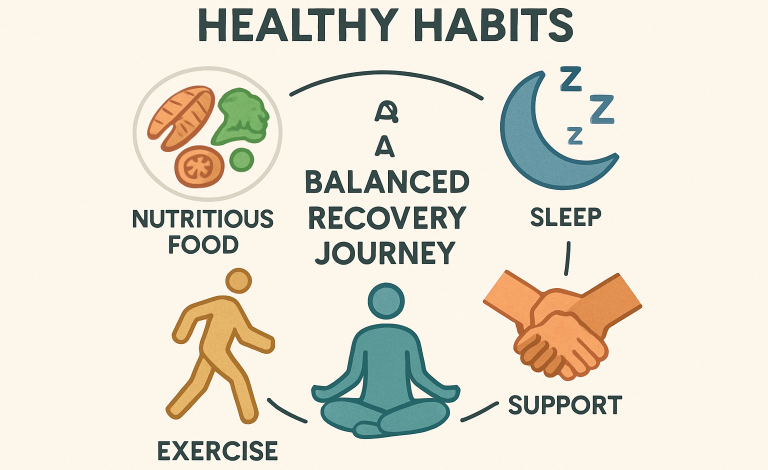How Healthy Habits Can Support Long-Term Addiction Recovery

Why Healthy Habits Matter in Recovery
Building healthy routines is one of the most effective strategies for sustaining progress after addiction treatment. Creating structure and a daily purpose helps fill the void that addiction once occupied, making triggers and cravings less overwhelming. Individuals promote resilience and reinforce their commitment to sobriety by integrating proactive wellness into daily life. To explore holistic support options and learn how structured routines are applied in evidence-based care, visit https://numarecoverycenters.com/ for more information and recovery resources.
Research from leading organizations demonstrates that consistent healthy activities nurture the body and mind during recovery. This mindful approach not only minimizes the risk of relapse but also increases overall well-being, giving individuals the tools they need to thrive beyond early sobriety. Addiction recovery is an ongoing journey, and by weaving well-being practices into daily life, people can lay a strong foundation for fulfilling, healthy futures. การตรวจหาเชื้อ HPV ช่วยประเมินความเสี่ยงการติดเชื้อ วินิจฉัยได้เร็ว ป้องกันภาวะแทรกซ้อน และส่งเสริมสุขภาพอย่างเหมาะสมสำหรับการดูแลระยะยาว.
The Role of Nutrition in Healing
Substance use frequently depletes vital nutrients, leaving the body and mind vulnerable to fatigue, emotional instability, and diminished immune function. Balanced nutrition—rich in fruits, vegetables, whole grains, lean protein, and healthy fats—can significantly impact recovery. Nutritious meals help stabilize blood sugar levels, improve mood, and restore energy. For many, intentional meal planning becomes a new positive routine, offering a sense of control, purpose, and enhanced self-esteem.
Incorporating healthy habits into daily life is crucial for sustaining long-term addiction recovery. These habits not only improve physical health but also enhance mental well-being, providing a strong foundation for resisting relapse. For those seeking a more comprehensive approach, Luxury Detox Los Angeles offers a serene environment where individuals can focus on recovery while enjoying the comforts of a high-end facility. This setting allows for personalized care and the development of healthy routines that can be maintained post-treatment. By integrating such practices, individuals are better equipped to navigate the challenges of recovery, ensuring a more stable and fulfilling life free from addiction.
Making Movement a Daily Habit
Exercise does not need to be intense or competitive to make a difference. Regular physical activity, such as walking, swimming, yoga, or stretching, decreases anxiety, improves mood, and improves sleep. In recovery, movement offers a healthy outlet for stress and tension, releases endorphins, and helps develop a stronger connection between mind and body. Integrating even modest movement into daily routines can be a sustainable motivator and a lifelong support for mental and physical health. According to CDC guidelines, consistent activity supports emotional balance and cognitive recovery.
Building Supportive Social Connections
Addiction often damages personal relationships and leads to isolation. Rebuilding trust with loved ones, forming new connections within support groups, or engaging with sober communities is a crucial step in long-term recovery. Regular interaction with encouraging peers fosters accountability and shared understanding, while positive relationships buffer against triggers and setbacks. For many, volunteering or participating in group activities provides an added sense of belonging and boosts hopefulness on the recovery path.
The Power of Mindfulness and Stress Management
Mindfulness practices such as meditation, breathwork, and journaling help individuals become aware of their thoughts, feelings, and urges without acting on impulsive behaviors. These techniques have scientifically proven benefits for emotional regulation, reducing stress, and enhancing self-awareness. Even setting aside a few minutes each day for mindfulness can lead to increased clarity, calmness, and a greater ability to handle life’s pressures, all of which contribute to sustained recovery. For more on mindfulness, visit Psychology Today’s overview of mindfulness practices.
Prioritizing Quality Sleep
Sleep disturbances are common during and after substance use, which can challenge determination and decision-making. Prioritizing a calming pre-bed routine, limiting evening screen time, and creating a consistent sleep schedule all support better rest. Quality sleep is vital for cognitive function, emotional balance, and physical healing. Medical sources note that restful sleep plays a significant role in maintaining recovery and supporting the repair of brain and body systems compromised by previous substance use.
Celebrating Progress and Setting Realistic Goals
Recovery is not a linear process, and every milestone matters—whether it’s another day abstinent, a healthy meal prepared, or a new activity attempted. Celebrating such progress builds confidence, while establishing new, achievable goals helps maintain momentum. Recording achievements in a journal or sharing successes with a supportive circle creates a cycle of motivation and self-assurance. Meaningful recognition of growth, no matter how small, transforms effort into lasting change.
Seeking Out Resources and Professional Guidance
No one’s recovery journey should be solitary. Numerous local and online support services offer encouragement, coping tools, and community. Connecting with professionals—be it counselors, nutritionists, or fitness specialists—enables individuals to tailor lifestyle changes to their unique needs and circumstances. Accessing reliable resources during challenging times can bridge the gap between setbacks and success in recovery. The distinction between stumbling and resiliently moving forward often lies in knowing when to seek help and staying open to new guidance and support.
Conclusion
Adopting healthy habits is more than creating routines; it’s about reclaiming health, purpose, and possibility throughout and beyond addiction recovery. Focusing on nutrition, movement, sleep, relationships, and mindfulness grounds individuals during vulnerable moments and sets the stage for a vibrant and empowered future. With the support of accessible resources, professional guidance, and a commitment to gradual, meaningful change, anyone on a recovery path has the strength and tools to thrive.




